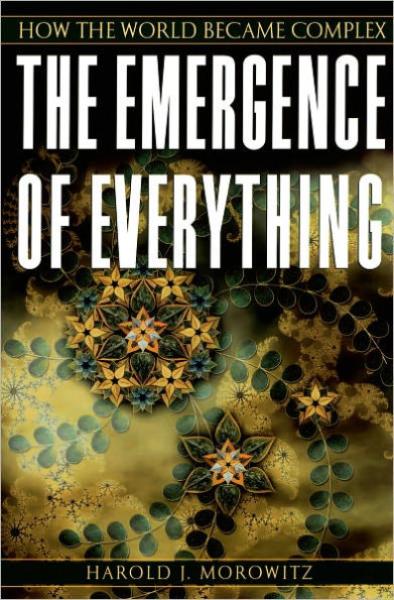Description
When the whole is greater than the sum of the parts--indeed, so great that the sum far transcends the parts and represents something utterly new and different--we call that phenomenon emergence. When the chemicals diffusing in the primordial waters came together to form the first living cell, that was emergence. When the activities of the neurons in the brain result in mind, that too is emergence.
In The Emergence of Everything, one of the leading scientists involved in the study of complexity, Harold J. Morowitz, takes us on a sweeping tour of the universe, a tour with 28 stops, each one highlighting a particularly important moment of emergence. For instance, Morowitz illuminates the emergence of the stars, the birth of the elements and of the periodic table, and the appearance of solar systems and planets. We look at the emergence of living cells, animals, vertebrates, reptiles, and mammals, leading to the great apes and the appearance of humanity. He also examines tool making, the evolution of language, the invention of agriculture and technology, and the birth of cities. And as he offers these insights into the evolutionary unfolding of our universe, our solar system, and life itself, Morowitz also seeks out the nature of God in the emergent universe, the God posited by Spinoza, Bruno, and Einstein, a God Morowitz argues we can know through a study of the laws of nature.
Written by one of our wisest scientists, The Emergence of Everything offers a fascinating new way to look at the universe and the natural world, and it makes an important contribution to the dialogue between science and religion.
Morowitz claims that emergence supplies us with a new foundation for religion-one that enables the natural sciences to supply a foundation for spiritual realities. -- C.P. Goodman, The Polyani Society Periodical
Closely reasoned and rich in scientific and philosophical background.--Scientific American
This is a brilliant book. Morowitz has provided the first state-of-the-art overview of the theory of emergence across the scientific disciplines. Neither too detailed nor too abstract, his 28 stages of emergence trace the history of the universe from the Big Bang through the appearance of culture, philosophy and spirituality. No other work has laid out the core case for emergence--and hence against the ultimacy of reductionism--across the whole spectrum of science. This introduction to emergence theory should guide philosophers of science and anthropologists, theologians and metaphysicians, as they reflect on the nature of Homo sapiens and our place in the cosmos.--Philip Clayton, Harvard University
In The Emergence of Everything, one of the leading scientists involved in the study of complexity, Harold J. Morowitz, takes us on a sweeping tour of the universe, a tour with 28 stops, each one highlighting a particularly important moment of emergence. For instance, Morowitz illuminates the emergence of the stars, the birth of the elements and of the periodic table, and the appearance of solar systems and planets. We look at the emergence of living cells, animals, vertebrates, reptiles, and mammals, leading to the great apes and the appearance of humanity. He also examines tool making, the evolution of language, the invention of agriculture and technology, and the birth of cities. And as he offers these insights into the evolutionary unfolding of our universe, our solar system, and life itself, Morowitz also seeks out the nature of God in the emergent universe, the God posited by Spinoza, Bruno, and Einstein, a God Morowitz argues we can know through a study of the laws of nature.
Written by one of our wisest scientists, The Emergence of Everything offers a fascinating new way to look at the universe and the natural world, and it makes an important contribution to the dialogue between science and religion.
Morowitz claims that emergence supplies us with a new foundation for religion-one that enables the natural sciences to supply a foundation for spiritual realities. -- C.P. Goodman, The Polyani Society Periodical
Closely reasoned and rich in scientific and philosophical background.--Scientific American
This is a brilliant book. Morowitz has provided the first state-of-the-art overview of the theory of emergence across the scientific disciplines. Neither too detailed nor too abstract, his 28 stages of emergence trace the history of the universe from the Big Bang through the appearance of culture, philosophy and spirituality. No other work has laid out the core case for emergence--and hence against the ultimacy of reductionism--across the whole spectrum of science. This introduction to emergence theory should guide philosophers of science and anthropologists, theologians and metaphysicians, as they reflect on the nature of Homo sapiens and our place in the cosmos.--Philip Clayton, Harvard University
Last updated on
Product Details
- Oxford University Press, Brand
- Apr 8, 2004 Pub Date:
- 0195173317 ISBN-10:
- 9780195173314 ISBN-13:
- 209 Pages
- 9.26 in * 6.1 in * 0.62 in Dimensions:
- 1 lb Weight:




